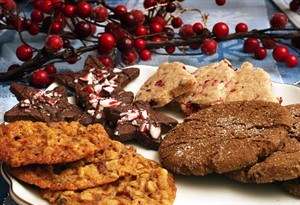
A good selection of cookies for the holiday season are shown in a file photo. From left, Chewy Cranberry-Oatmeal Cookies, Chocolate Peppermint Stars, Cranberry-Orange Shortbread Cut-Outs and Giant Ginger Cookies. It's a given: There will be a lot of overeating over the holidays.THE CANADIAN PRESS/AP Photo/Larry Crowe
December 15, 2014 - 12:22 PM
TORONTO - It's a given: There will be a lot of overeating over the holidays.
There are all those special high-cal foods that family traditions link to holiday celebrations. Plum pudding and brandy sauce (a.k.a butter plus sugar plus alcohol). Eggnog (cream plus eggs plus sugar plus alcohol). Mashed potatoes whipped with sour cream and-or cream cheese and plenty of butter. Shortbread cookies. Mincemeat tarts. Gravy.
The traditional holiday foods are generally highly calorific and the opportunities to consume them abound. The office party. Parties hosted by friends, or just informal get-togethers when people from out of town drop by. The big meal Christmas day. Hanukkah parties. New Year's Day levees.
Given that the holidays are a season of excess we thought we'd ask some dietary experts for advice on how to contain the damage.
Specifically we asked: If there is one thing we could cut out of holiday fare to make the feasting less excessive, what would that be?
Surprisingly, several of our experts did not advise eliminating a particular food. And a number didn't even frown on the idea of seasonal indulgence. But they did offer some suggestions for how to contain the holiday calories.
"I would say that if overeating is ever allowed, that it is allowed for the major festivities that occur a few times a year — provided that food intake is controlled the rest of the time," says Thomas Wolever, a professor in the University of Toronto's department of nutritional sciences.
Wolever says overeating by 2,500 calories — in other words, doubling an average daily intake — on three days a year can be offset by cutting back 20 calories per day for the other 362 days.
"A weight management program will not be set back by indulging a few times a year — provided discipline is maintained most of the time," he says.
Len Piche suggests focusing on portions and finding low-calorie options when they exist, such as sugar-free mixes for holiday drinks.
Savour foods slowly, using smaller servings on smaller plates to help limit the calories, says Piche, a nutrition professor at Western University's Brescia University College.
Do drink water before a meal. Don't skip breakfast or lunch to focus on a big dinner.
"Trying to 'save yourself' for big meals by skipping meals earlier in the day might backfire. You may develop a ravenous appetite and end up eating more calories than you normally would by overeating," Piche says.
Rena Mendelson, a professor of nutrition at Ryerson University in Toronto, also offers some tips that might help you control your calorie intake better at a big holiday meal.
"Before you go to a holiday party, have a bowl of soup and avoid any of the pre-meal treats as they tend to be very high in calories," she says.
"Eat the main meal and have enough to feel satisfied but not overfed. This may help to limit the dessert course so that you eat just enough to taste and enjoy without having too much and feeling overfed."
Wolever has some advice for between meals, when family and friends gather to chat, play games or watch TV. Forgo the snacks.
"Once you start you can't stop. Don't even put them out. Or if you feel you have to put them out only put out a small amount or put out cut-up raw vegetables — no dips — like carrots, celery, peppers, mushrooms and cucumber," he says.
Watch your liquid calories, suggests Dr. Yoni Freedhoff, a professor of obesity medicine at the University of Ottawa.
"If I were to pick one thing to ditch, it would be the sweet stuff as many a home has the tradition of sugary soda for festive meals," he says.
"There are plenty of indulgences to be had during that holidays that we don't also need to be drinking liquid candy."
Freedhoff also recommends eating mindfully, paying attention to what you are popping into your mouth. Ask yourself if the item you are about to consume is worth the calories and, if it is, how much you need to eat to feel satisfied.
"Don't ask the questions and I guarantee everything will be worth it and you'll take more than you need," he says.
One dietary expert did recommend a food item to cut from the holiday feasting. And Dr. David Jenkins acknowledges his nomination may qualify him for the role of the Grinch.
Jenkins suggests cutting out the turkey — or goose or ham — whatever the main meat dish is in your holiday dinner.
It's not that Jenkins thinks it's the least healthy portion of a holiday feast. It's that pulling out the linchpin, so to speak, would fundamentally change our approach to the meal. He thinks with the planet's expanding population, climate change and the obesity epidemic, it's time to start thinking about eating in a more sustainable way.
"It would be a radical change in the 'sit-down-and-gorge' concept that's the centre of Christmas," says Jenkins, a researcher at St. Michael's Hospital in Toronto who studies the effects on cholesterol and health of eating more plant-based foods and less processed food products.
"It forces people to think about other options," he says of his recommendation. "They may think, hopefully, of more environmentally friendly options. They may think of more plant-based diets. They may do all sorts of things that may be interesting.
"They may, in fact, forgo a large meal and go out and do some snowboarding. ... I think that we've got to start thinking about other things at Christmas than sitting down and getting comfort food."
News from © The Canadian Press, 2014